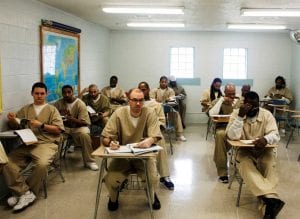 What may seem like the end of the road for some could actually be the beginning of a better future. While this is not a common practice outside of America, there are a few countries that implement inmate education.
What may seem like the end of the road for some could actually be the beginning of a better future. While this is not a common practice outside of America, there are a few countries that implement inmate education.
Thailand has been providing life skills, literacy and vocational training to a bachelors degree, since 1949. Inmates in Australia and Scandinavia have the same opportunities to go on to university but other counties such as Germany, Europe, Romania, England and Europe are more focused on employment after prison.
There are some institutions which are invested in procuring a university personal statement from interested parties. This gives those who might not have had the best beginnings or those who had less desirable experiences, a chance at proving their worth through something more personalized than a few sheets of qualifications or a resume. Having the chance to explain why someone is deserving of something is a powerful tool. It allows educators much more insight.
However, as argued by Senator Hutchinson that is it a crime for someone to “rob a store, go to jail and get a degree”. Similar sentiments were echoed by Maziarz, “The whole notion of rewarding bad behavior is completely backwards. It should be — do the crime, do the time — not do the crime, earn a degree. It is simply beyond belief to give criminals a competitive edge in the job market over law-abiding New Yorkers who forgo college because of the high cost”.
Regardless of how backwards the system was, it has proven to be much more productive as Govenor Cuomo explained, “It costs $60,000 per year to house an inmate in prison, and it costs an estimated $5,000 per year to provide higher education”, finishing off with how the country has the “highest rates of recidivism” and “solutions that reduce that rate are the best method for reducing overall costs”.
There are studies regarding the rate of criminals returning to a life of crime upon receiving an education, suggesting that successful rehabilitation stands at 57 percent. 80 percent of juveniles are illiterate, and 60 percent of the entire population of prison inmates are as well.
Erwin James who served 20 years in prison opened up to The Guardian with his account of receiving an education in jail. “Education in prison is the last bastion of rehabilitation. It is the only area in a prison where the prisoner is seen as a student, a learner and an individual with specific needs first – and an offender second”, he wrote, ” Some 82% of prisoners are at or below the writing level of an 11-year-old, and half of all prisoners do not have the skills required by 96% of jobs. Only one in five people in prison are able to complete a job application form.” Following his release in 2004, he has become a columnist and he thanks his counsellor for encouraging him to go for English classes.
Another example of a successful rehabilitation program comes from Frank Harris over at BBC. The 57 year old has been in and out of prison for more than 30 years but he found salvation through education and wanted to share his story in order to inspire others to follow suit, his exact words being, “if you find yourself on the that road, if you are in prison, there’s a way out and it’s education.”
In 2009, he set up a school to help young boys stay out of prison. The west Indian boys in Islington, but it was closed down due to the loss of its venue. The School of High Achievers for West Indian boys in Islington was shut down due to the loss of its venue, but the school was invested in providing workshops such as drumming to its students.
That was not all that he has achieved upon his release. In 2013, he completed his second year for a bachelor in criminology and criminal justice and while he was in prison, he achieved high grades for English and Maths in GCSE despite being expelled from school at the tender age of 12.
Education is important to people from all walks of life, and is especially important for a successful civilization whereby ethics and morals should be taken into consideration. It is the only method of expanding one’s mind and it does not hurt that those locked away have nothing more to look forward to the classes offered.
While tax payers might feel it is an unfair system to reward bad behaviour and for breaking the law with a free education whereby law-abiding citizens fork out thousands of dollars to put themselves or their spawn through education, perhaps it is beneficial to take a step back and look at the bigger picture. Not everyone was born with the same privileges, nor given a fair start in life. Aside from examinations of equity, there is also the question of what is most efficient.
Without intervention, crime will continue its prevalence, but with an education, criminals are able to be re-integrated into society and become law-abiding, tax-paying citizens.
If you would like to contribute an article or contact our contributors, you can get in touch here
